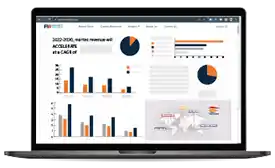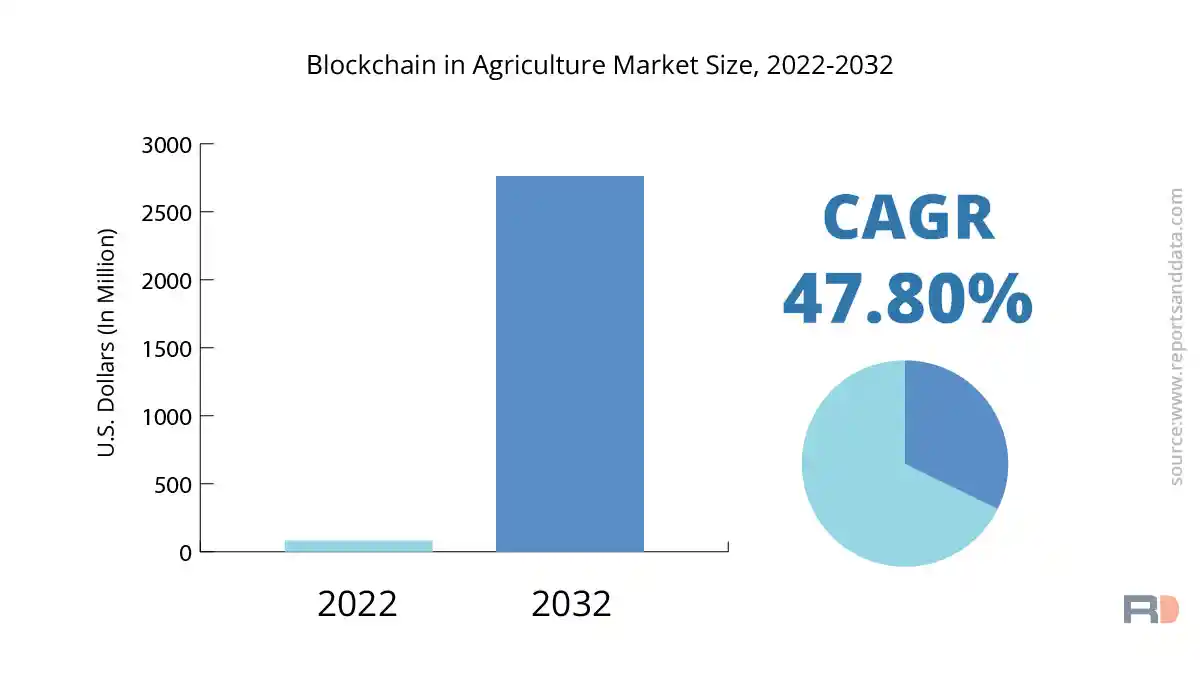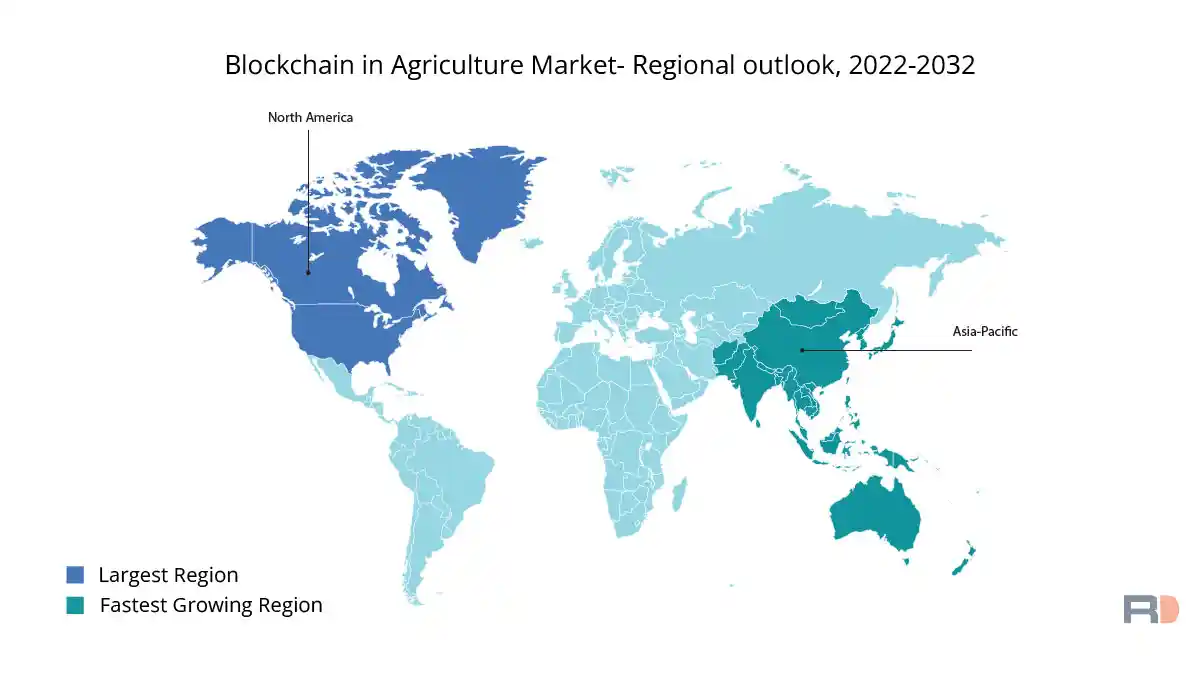Want to curate the report according to your business needs
Report Description + Table of Content + Company Profiles

The market value for Blockchain in Agriculture Market was USD 82.03 million in 2022 and is expected to reach USD 2760.85 million in 2032 growing at a CAGR of 47.8% during the forecast period. The desire for food traceability, the requirement for transparency in the food supply chain, and the expanding use of Blockchain Technology in agriculture are the main factors driving market revenue growth.
To establish a safe and transparent food supply chain, blockchain technology is being used in agriculture more frequently. Through the use of technology, the provenance of food products may be tracked and traced, ensuring food safety and quality. It makes it possible for farmers, distributors, and customers to get access to precise and trustworthy information on food products, such as where they come from, how they are made, and how they are distributed.

Blockchain in agriculture is becoming more and more popular as the demand for food traceability grows. Consumers are becoming more conscious of the value of understanding the origins and production processes of their food. A Digital ledger that contains all the details about the food products, from farm to fork, can be created using blockchain technology. This raises consumer confidence in the food supply chain and raises the general standard of food items.
Additionally, the agriculture industry's increasing use of blockchain technology is boosting market revenue growth. Crop management, animal management, supply chain management, and food safety are just a few of the agricultural applications that blockchain technology can be employed in. Process automation aids in streamlining procedures and lowering administrative burdens, which boosts productivity and lowers costs.
The rise in market income is also being driven by the rising demand for organic and sustainable food items. Blockchain technology can assist in authenticating organic and sustainable food items to make sure they adhere to the necessary criteria. Customers become more trusting and confident as a result, driving up demand for these goods.
Government programmes and rules that are meant to increase the efficiency and openness of the food supply chain are also a major factor in the rise in market revenue. For instance, the General Data Protection Regulation (GDPR) of the European Union and the Food Safety Modernization Act (FSMA) of the United States mandate that food companies keep accurate and comprehensive records of their products. By giving people a safe and transparent mechanism to store and share information, blockchain technology can help us satisfy these needs.
But a number of unfavourable factors, such as high implementation costs, a lack of technical know-how, and the requirement for interoperability across various blockchain platforms, significantly restrict the growth of the blockchain in agriculture industry. The lack of knowledge among farmers and other stakeholders in the agriculture business regarding blockchain technology and its advantages is another factor that is anticipated to have a negative impact on market revenue growth over the course of the forecast period.
The need for transparency in the food supply chain, increased consumer demand for food traceability, and the expanding use of blockchain technology in agriculture are projected to generate significant growth in the market for blockchain in agriculture over the upcoming years. The market is nevertheless dealing with difficulties like high implementation costs, a lack of technical know-how, and the requirement for compatibility between various blockchain systems. Overcoming these difficulties and raising awareness of the advantages of the technology among farmers and other stakeholders are essential for the effective implementation of blockchain technology in the agricultural sector.
In 2021, the worldwide blockchain in agricultural market's revenue was dominated by the supply chain tracking segment. This is a result of the rising need for food safety and quality assurance as well as the requirement for supply chain transparency. Systems that track the passage of goods from the farm to the table using blockchain technology make it possible to ensure that nothing is tainted or tampered with while being transported. By fostering confidence between consumers and producers, this promotes the segment's revenue growth.
During the projected period, the revenue CAGR for the payment and settlement segment is anticipated to be the quickest. This is a result of the agricultural sector using blockchain technology for payments more frequently. Blockchain-based payment systems offer a safe and transparent means to transmit money, lowering the risk of fraud and improving the effectiveness of the payment process. Farmers who utilise blockchain technology for payments can now access financial services like loans and insurance that they had previously been unable to. Throughout the projection period, this is anticipated to fuel revenue growth in the segment.
During the projected period, the smart contracts segment's revenue is also anticipated to expand significantly. The details of the agreement between the buyer and seller are directly encoded into lines of code in smart contracts, which are self-executing contracts. By automating procedures like land leases, crop insurance, and commodity trading, smart contracts in agriculture can help cut down on the need for middlemen and boost productivity. Throughout the projection period, this is anticipated to fuel revenue growth in the segment.
The "others" area, which covers a variety of blockchain-based applications for the agriculture sector, such as crop management, animal tracking, and food safety, is the last one. During the projected period, revenue growth in this sector is anticipated to be driven by the expanding requirement for data-driven decision making and the rising need for sustainable agricultural practises.
In 2021, middleware suppliers had the majority of the market's revenue. Software that makes it easier for several software applications to communicate and exchange data is referred to as middleware. Blockchain solutions from middleware vendors are available to the agriculture sector's stakeholders, including farmers, processors, distributors, and retailers, to enable frictionless data sharing and transaction management. This aids in enhancing the accountability, traceability, and visibility of the supply chain and can lower transaction costs. As a result, the need for middleware solutions has increased in the agriculture sector, fueling this segment's revenue development.
During the projected period, revenue growth for infrastructure providers is anticipated to be strong. These companies supply network, storage, and hardware elements that constitute the foundation of the infrastructure needed to enable blockchain platforms. The demand for infrastructure providers who can provide scalable and secure solutions has increased as blockchain technologies for agriculture are adopted more widely. Furthermore, the employment of blockchain technology in agriculture necessitates the storing of enormous amounts of data, which calls for high-performance hardware and storage components. In order to create and implement blockchain solutions in the agriculture sector, infrastructure providers are anticipated to be extremely important.
The fastest revenue growth during the forecast period is anticipated to be experienced by application providers. These companies provide blockchain-based solutions for certain use cases in the agricultural sector, including crop management, supply chain management, and food safety. Although the use of blockchain-based solutions in agriculture is still in its infancy, this industry has enormous development potential. Farmers and other stakeholders are anticipated to want more blockchain-based applications as the advantages of the technology become more obvious, which would boost income for application providers.
A growing demand for food traceability and supply chain transparency is expected to cause the Asia Pacific region to lead the worldwide blockchain in agricultural market over the forecast period. Government measures to promote the usage of blockchain technology, together with the expansion of the agriculture sector in nations like China and India, are anticipated to fuel market expansion in the area. The use of blockchain technology in agriculture has the potential to improve the effectiveness of supply networks and lessen food fraud, a major problem in the area. Additionally, the Asia Pacific region's market expansion is anticipated to be further fueled by the existence of numerous blockchain technology providers and rising investment in R&D activities.
The adoption of cutting-edge technology in the agriculture sector is likely to drive considerable growth in the North American market over the forecast period. Due to the existence of important businesses in the area and the support provided by the administration for the use of blockchain technology in agriculture, the United States is a significant contributor to the growth of the market in North America. Additionally, the region's agriculture sector is seeing a rise in demand for blockchain technology due to the necessity for transparency in the food supply chain and the growing popularity of organic farming. Blockchain technology can be used to manage food recalls and cut down on food waste, which will help the industry flourish.
Because blockchain technology is becoming more widely used in the agriculture sector, the Europe market is anticipated to rise steadily throughout the projected period. The area is home to a number of significant market participants and government efforts encouraging the application of blockchain technology in numerous industries, including agriculture. The existence of numerous food and beverage businesses in the area is also anticipated to increase demand for blockchain technology, which will guarantee supply chain transparency and food safety. By maximising the utilisation of resources, blockchain technology deployment in the area can also aid in lowering the environmental impact of agriculture.

For the purpose of this report, we have segmented the global Blockchain in Agriculture Market based on application, provider type, organization size, and region:
| PARAMETERS | DETAILS |
| The market size value in 2022 | USD 82.03 Million |
| CAGR (2022 - 2032) | 47.8% |
| The Revenue forecast in 2032 |
USD 2760.85 Million |
| Base year for estimation | 2022 |
| Historical data | 2020-2021 |
| Forecast period | 2022-2032 |
| Quantitative units |
|
| Report coverage | Revenue forecast, company ranking, competitive landscape, growth factors, and trends |
| Segments covered | By Application Outlook, Provider Type Outlook, Organization Size Outlook, Regional Outlook |
| By Application Outlook |
|
| By Provider Type Outlook |
|
| By Organization Size Outlook |
|
| Regional scope | North America; Europe; Asia Pacific; Latin America ; Middle East & Africa |
| Country scope | U.S.; Canada; U.K.; Germany; France; BENELUX; China; India; Japan; South Korea; Brazil; Saudi Arabia; UAE; Turkey |
| Key companies profiled | IBM Corporation, AgriChain Pty Ltd, TE-FOOD International GmbH, Chainvine Limited, Agrimetrics Limited, VeChain Foundation, AgriDigital Pty Ltd, Ripe Technology Inc, Provenance Ltd, HarvestMark Inc |
| Customization scope | 10 hrs of free customization and expert consultation |
Facing issues finding the exact research to meet your business needs? Let us help you! One of our Research Executives will help you locate the research study that will answer your concerns. Speak to Analyst Request for Customization
Request a FREE Sample here to understand what more we have to offer over competition…
upto20% OFF
upto20% OFF
Want to curate the report according to your business needs
Report Description + Table of Content + Company Profiles
